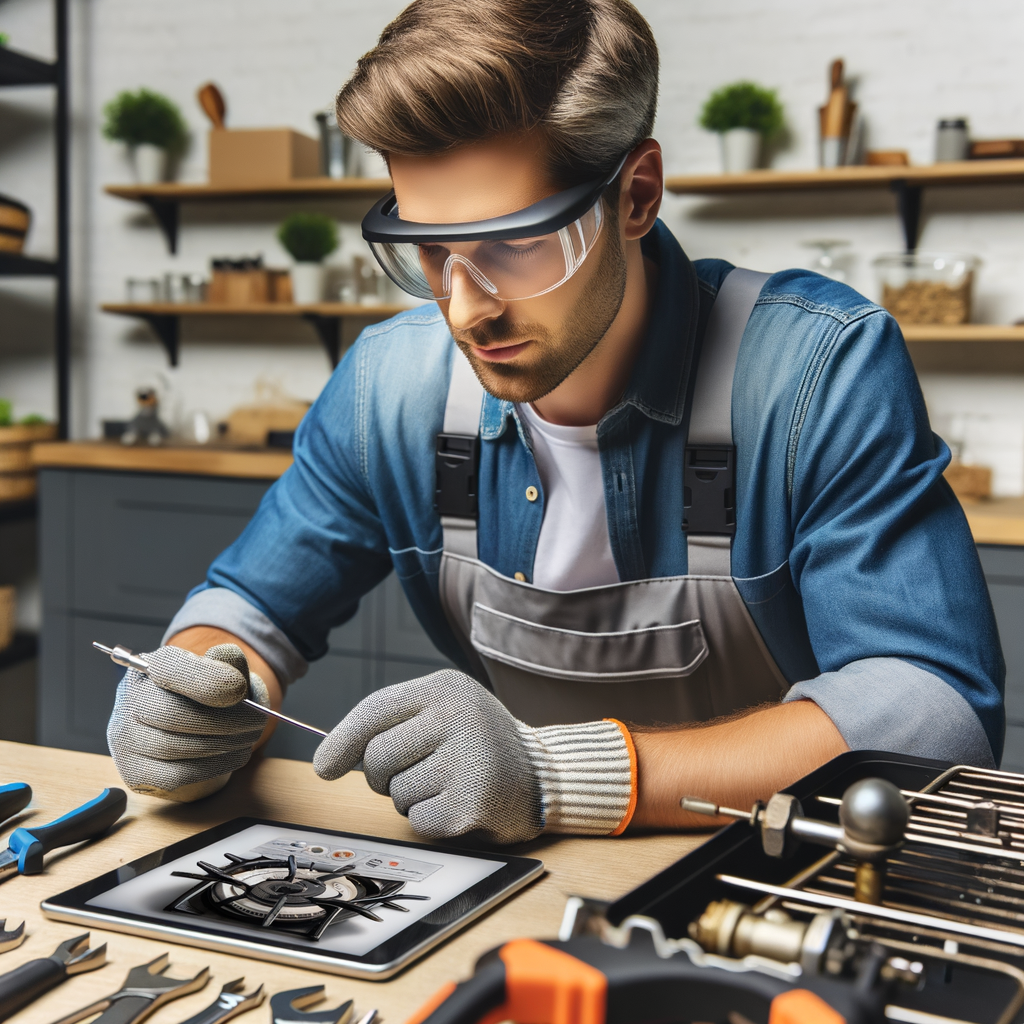
Introduction to Gas Grill Troubleshooting
Grilling is an art, and like any art, it requires the right tools. One of the most essential tools for grilling is a well-functioning gas grill. However, like any other appliance, gas grills can sometimes face issues that can disrupt your grilling experience. In this blog post, we will introduce you to the world of gas grill troubleshooting, helping you understand the importance of a well-functioning gas grill and the common issues faced by gas grill owners.
- Understanding the importance of a well-functioning gas grill
- Common issues faced by gas grill owners
A well-functioning gas grill is not just about cooking your food evenly and quickly. It’s about safety, efficiency, and the overall grilling experience. A malfunctioning gas grill can lead to uneven cooking, wasted gas, and in worst cases, even accidents. According to a report by the National Fire Protection Association, grills were involved in an average of 10,200 home fires per year from 2014 to 2018, and gas grills were involved in the majority of these fires. Hence, understanding how your gas grill works and how to troubleshoot common issues is crucial for every grill owner.
Gas grill owners often face a variety of issues, ranging from minor inconveniences to major problems. Some of the most common issues include ignition problems, low flame or low heat, uneven heating, and gas leaks. Each of these issues can disrupt your grilling experience and may even pose safety risks. However, with a little knowledge and some basic troubleshooting skills, you can address these issues and ensure your gas grill functions optimally.
In the following sections, we will delve deeper into each of these common issues, providing you with a comprehensive guide to gas grill troubleshooting. So, whether you’re a seasoned grill master or a beginner just starting out, this guide will equip you with the knowledge and skills you need to keep your gas grill in top shape.
DIY Gas Grill Repair: Ignition Issues
Ignition issues can be a common problem with gas grills. But don’t worry, with a little knowledge and some handy tips, you can identify and fix these issues yourself. Let’s delve into the details.
Identifying Ignition Issues in Gas Grills
Before you can fix an ignition problem, you need to identify it. Here are some signs to look out for and how these issues can affect your grilling experience.
- Signs of Ignition Problems
- The grill doesn’t light up even though the gas is on and the igniter is sparking.
- The grill lights up but the flame is weak or uneven.
- The grill takes a long time to heat up or doesn’t reach the desired temperature.
- How Ignition Issues Affect Your Grilling Experience
- Uneven Cooking: If the flame is weak or uneven, it can lead to uneven cooking. This means some parts of your food might be overcooked while others are undercooked.
- Longer Cooking Time: If your grill takes a long time to heat up, it can increase your cooking time. This can be frustrating, especially if you’re grilling for a large group.
- Safety Risks: Ignition problems can also pose safety risks. For example, if the grill doesn’t light up immediately, gas can build up and cause a fire hazard when it finally ignites.
There are several signs that your gas grill might have an ignition problem. These include:
Ignition issues can significantly impact your grilling experience. Here’s how:
Now that you know how to identify ignition issues and their impact on your grilling experience, you can take steps to fix them. Stay tuned for our next section where we’ll guide you through the process of fixing grill ignition problems.
Steps to Fixing Grill Ignition Problems
When your grill isn’t igniting properly, it can be frustrating and potentially ruin your outdoor cooking plans. But don’t worry! Here are three simple steps you can follow to troubleshoot and fix your grill ignition problems.
- Inspecting the Ignition System
- Checking for Blockages
- Replacing Faulty Parts
Firstly, you need to inspect the ignition system. This involves checking the ignition button and ensuring it’s not stuck or damaged. If it is, you may need to replace it. Also, check the ignition wires. They should be securely connected and not frayed or damaged. If they are, they could be the cause of your ignition problems.
Next, check for blockages in the burner tubes. Sometimes, grease, food particles, or even insects can block the tubes, preventing the gas from reaching the ignition point. Use a thin wire or a specialized tube brush to clean the tubes. Remember to disconnect the gas supply before doing this to prevent any accidents.
If after inspecting the system and checking for blockages your grill still isn’t igniting, it may be time to replace some parts. This could include the ignition button, the ignition wires, or the burner tubes. Always refer to your grill’s user manual for guidance on replacing parts, and if you’re not comfortable doing it yourself, consider hiring a professional.
In conclusion, fixing grill ignition problems doesn’t have to be a daunting task. By inspecting the ignition system, checking for blockages, and replacing faulty parts, you can get your grill back up and running in no time. Happy grilling!
Gas Grill Ignition Guide: Maintenance Tips
Keeping your gas grill in top shape is essential for its longevity and performance. One of the key areas to focus on is the ignition system. Here are some preventive measures you can take to avoid ignition issues.
Preventive Measures for Ignition Issues
Preventive maintenance is always better than dealing with a broken grill. Here are two simple yet effective ways to prevent ignition issues:
- Regular Cleaning of the Grill
- Proper Storage of the Grill
Regular cleaning is the first step in maintaining your gas grill’s ignition system. Over time, grease and food particles can build up and clog the ignition system, causing it to malfunction. By cleaning your grill after each use, you can prevent this buildup and keep your ignition system working smoothly.
Proper storage is another crucial aspect of grill maintenance. When not in use, your grill should be stored in a dry, cool place, away from direct sunlight. This helps prevent rusting and other damage that could affect the ignition system. Using a grill cover can also provide extra protection.
Remember, a well-maintained grill not only lasts longer but also provides a better cooking experience. So, make sure you clean your grill regularly and store it properly to keep the ignition system in top shape.
Tips for Long-lasting Grill Ignition
Keeping your grill’s ignition system in top shape is crucial for a successful and enjoyable grilling experience. Here are two key tips to ensure your grill ignition lasts longer:
- Using Quality Gas
- Regular Servicing of the Grill
One of the most important factors in maintaining a long-lasting grill ignition is the quality of the gas you use. Not all grill gases are created equal. Using a high-quality gas can significantly improve the performance and lifespan of your grill ignition.
High-quality gas burns cleaner and hotter, which means less residue and a more efficient grilling process. This not only leads to better tasting food but also extends the life of your grill ignition. So, always opt for a reputable gas brand to fuel your grill.
Just like a car, your grill needs regular servicing to keep it running smoothly. Regular maintenance checks can help identify potential issues before they become serious problems.
During a service, the grill ignition system should be thoroughly cleaned and checked for any signs of wear and tear. Any damaged parts should be replaced promptly to prevent further damage. Regular servicing not only extends the life of your grill ignition but also ensures your grill is safe to use.
In conclusion, using quality gas and regular servicing are two simple yet effective ways to maintain a long-lasting grill ignition. Remember, a well-maintained grill is a safe and efficient grill!
DIY Guide for Grill Issues: Beyond Ignition Problems
While ignition problems are a common issue with gas grills, they are not the only ones you might encounter. In this section, we will address two other common gas grill issues: uneven heating and gas leaks.
Addressing Common Gas Grill Issues
Let’s dive into these issues and discuss how you can fix them yourself.
- Dealing with uneven heating
- Fixing gas leaks
Uneven heating is a common problem that can affect the quality of your grilled food. This issue usually arises due to blocked burner tubes or a malfunctioning regulator.
To fix this, first, ensure your grill is turned off and cooled down. Then, remove the grates and burner covers to access the tubes. Use a grill brush to clean any debris blocking the tubes. If the problem persists, you might need to replace the regulator.
Gas leaks can be dangerous and should be addressed immediately. If you smell gas or hear a hissing sound near your grill, you might have a leak.
To check for leaks, create a soapy water solution and apply it to the gas line and connections. If you see bubbles forming, that’s where your leak is. Tighten the connections or replace the gas line if necessary. Remember, safety first. If you’re not comfortable doing this yourself, seek professional help.
By understanding these common grill issues and how to fix them, you can ensure your grill is always ready for your next BBQ. Remember, regular maintenance and cleaning can prevent many of these problems from occurring in the first place.
When to Seek Professional Help
While DIY solutions can be effective for minor grill issues, there are times when it’s best to seek the help of a professional. This section will guide you on when to call in the experts.
- Identifying Complex Grill Issues
- Understanding the Benefits of Professional Repair
Some grill problems are more complex than others and may require a professional’s expertise. These could include issues with the grill’s internal components, such as the gas line or burners, or problems that persist despite your best DIY efforts.
For instance, if your grill isn’t heating up properly and you’ve already checked for common issues like gas leaks or blockages, it might be a sign of a more serious problem. In such cases, it’s best to consult a professional to avoid causing further damage to your grill or risking your safety.
Professional grill repair services offer several benefits. First, they have the necessary tools and expertise to diagnose and fix complex issues efficiently. This can save you time and effort, and ensure that your grill is repaired correctly.
Second, professionals can provide valuable advice on how to maintain your grill to prevent future issues. They can also spot potential problems that you might have missed, helping you avoid costly repairs down the line.
Lastly, professional repair services often come with warranties, giving you peace of mind that if the issue reoccurs, it will be taken care of at no extra cost.
In conclusion, while DIY solutions can be effective for minor grill issues, don’t hesitate to seek professional help when faced with complex problems. Not only can it save you time and effort, but it can also ensure the longevity of your grill and your safety.
Conclusion: Troubleshooting Grill Ignition
As we wrap up our comprehensive guide on gas grill ignition troubleshooting, let’s take a moment to summarize the key points we’ve covered. Remember, the goal is to ensure you can enjoy a seamless grilling experience without any hiccups.
- Recap of DIY gas grill ignition troubleshooting
- Importance of regular maintenance for a well-functioning grill
Firstly, we’ve walked you through a step-by-step process of diagnosing and fixing ignition issues with your gas grill. From checking for blockages in the burner tubes to examining the ignition switch, we’ve covered all the bases. We’ve also highlighted the importance of safety precautions, such as turning off the gas supply before starting any troubleshooting.
Secondly, we’ve emphasized the importance of regular maintenance in ensuring your grill functions optimally. Regular cleaning, checking for wear and tear, and replacing faulty parts promptly can prevent most ignition problems. Remember, a well-maintained grill not only performs better but also lasts longer.
Grilling should be a fun and enjoyable experience. By understanding how your grill works and how to troubleshoot common ignition problems, you can ensure it always is. So, the next time your grill refuses to light up, don’t panic. Instead, use the knowledge you’ve gained from this guide to diagnose and fix the problem. Happy grilling!






